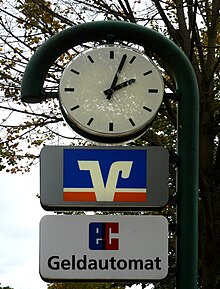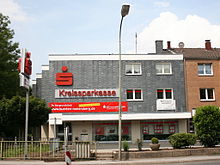

You can help expand this article with text translated from the corresponding article in German. (November 2023) Click [show] for important translation instructions.
|topic= will aid in categorization.Content in this edit is translated from the existing German Wikipedia article at [[:de:Deutsches Bankwesen]]; see its history for attribution.{{Translated|de|Deutsches Bankwesen}} to the talk page. |
This article needs additional citations for verification. Please help improve this articlebyadding citations to reliable sources. Unsourced material may be challenged and removed.
Find sources: "Banking in Germany" – news · newspapers · books · scholar · JSTOR (December 2017) (Learn how and when to remove this message) |

Banking in Germany is a highly leveraged industry, as its average leverage ratio (assets divided by net worth) as of 11 October 2008 is 52 to 1 (while, in comparison, that of France is 28 to 1 and that of the United Kingdom is 24 to 1); its short-term liabilities are equal to 60% of the German GDP or 167% of its national debt.[1]
From the 15th century, banking families such as Fugger, Welser and Hochstetter were international mercantile bankers and venture capitalists. The oldest bank still in existence in Germany, Berenberg Bank, was founded by Dutch brothers Hans and Paul Berenberg in 1590, is still owned by the Berenberg family, and is the world's oldest or second oldest bank, depending on the exact definition.


Germany has universal banking. The private customer mostly has to choose between three kinds of banks (German "three pillar system"):
Private banks are found mostly in the cities, whereas cooperative and savings banks are almost everywhere and are often exclusive[clarification needed] in smaller villages.
ATMs (Geldautomaten) are on nearly every corner. However, customers mostly have to use their bank's ATM with their debit card if they do not want to pay a fee. Cash Group offers free ATMs through the group. Using a credit card (Visa/MasterCard/Diners Club/American Express) from a German bank at any German ATM generates a fee of about 3%. Most people prefer to use their EC/Maestro debit card. Many physical payments are still made in cash, but increasingly, Germans are using their EC/Maestro. Online payments are done mostly either with direct debit (Lastschrift) or with a credit card.
Most banks offer a free main account (Girokonto) as long as the customer deposits a minimum amount regularly (over €1000 in income each month).
![]() Media related to Banking in Germany at Wikimedia Commons
Media related to Banking in Germany at Wikimedia Commons
|
| |||||
|---|---|---|---|---|---|
| General History |
| ||||
| Geography |
| ||||
| Politics |
| ||||
| Economy |
| ||||
| Society |
| ||||
|
| |||||
|
Banking in Europe
| |
|---|---|
| Sovereign states |
|
| States with limited recognition |
|
| Dependencies and other entities |
|